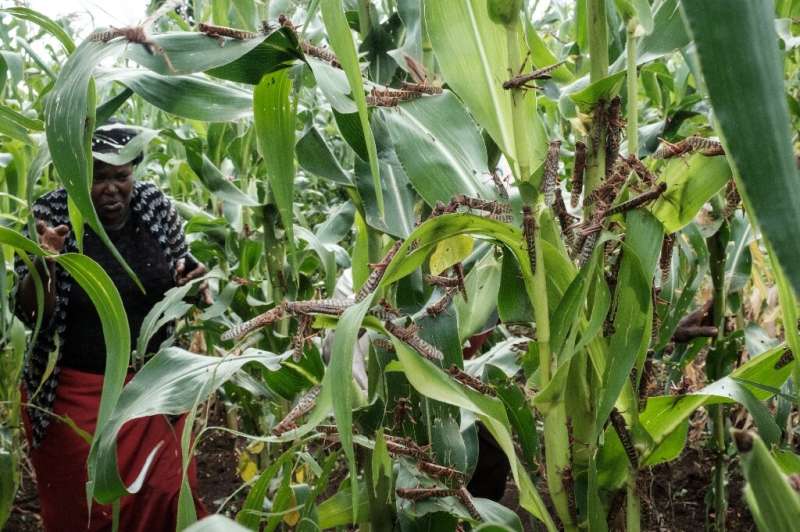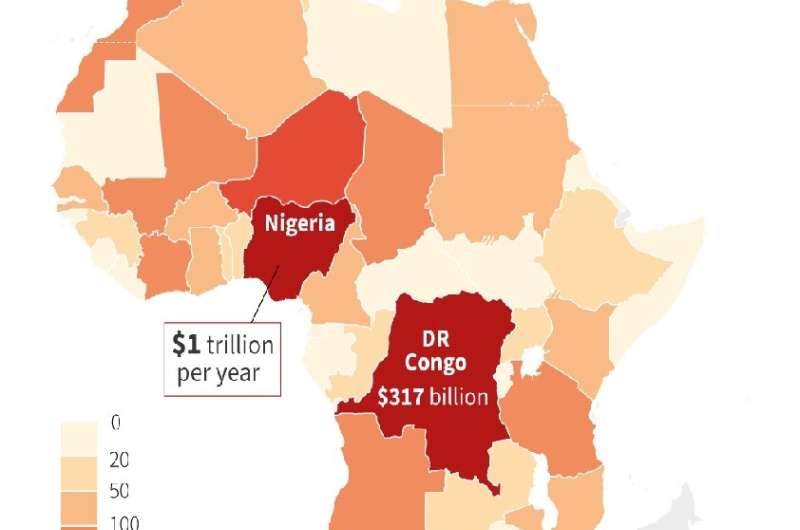Invasive species costing Africa $3.66 tn a year: study

Invasive species introduced by human activity are costing African agriculture some $3.66 trillion every year—around 1.5 times the combined gross domestic product of all African countries—new research showed Thursday.
Non-native species of weed, insect or worm can have catastrophic effects on farming, with just a single bug capable of reducing yields of staple crops across the continent.
Now researchers based in Ghana, Kenya, Britain and Switzerland have sought to estimate the annual economic hit caused by invasive species to African agriculture.
The team studied open source and peer-reviewed literature on species that were not native to the continent but had caused crop losses to assess the economic impact on yield, management and the cost of research.
Next, they surveyed more than 1,000 stakeholders—including farmers, researchers and government officials—about the financial implications of invasive species.
Participants were asked to estimate crop losses caused by invasive alien species as well as the costs incurred.
Thee team found that the average cost of invasive alien species to the agricultural sector in Africa's 54 countries was $74.3 billion each year.
But there was substantial variation among countries. The worst affected nations were found to be Nigeria—which loses around $1 trillion annually due to invasive species—and the Democratic Republic of the Congo, which loses $317 billion each year.
In all, economic losses by invasive alien species were found to exceed the GDP of 27 out of 49 countries included in the study, which was published in the journal CABI Agriculture and Bioscience.
'Wake-up call
The overwhelming majority (99.2 percent, or $3.63 trillion) of estimated total costs inflicted by alien species came from removing invasive weeds from crops.

Weeding cereal crops accounted for 72 percent ($2.61 trillion) of this, the authors found, while weeding maize and root crops accounts for 14 percent ($508 billion) and weeding vegetables accounts for 3.3 percent ($120 billion).
Rene Eschen, corresponding study author from Switzerland's CABI research institute, said the research highlighted the hidden economic and social costs of having to weed crops across the continent.
"The removal of invasive alien weeds is largely unpaid work and is primarily carried out by women and children, reducing the amount of time they are able to spend on income-generating and community activities or education," he said.
The species found to cause the most crop losses was a moth known as Phthorimaea absoluta, which affects tomato plants, at an estimated cost of $11.4 billion annually.
Other insects were estimated to inflict more than $21.5 billion worth of crop losses each year to maize, cassava and mango and citrus crops.
The authors cautioned that their findings may in fact underestimate the true economic cost of invasive species to Africa's agriculture sector, as they didn't include costs related to chemical herbicides used to control pests and disease.
Kat Kramer, climate change lead at Christian Aid, said Thursday's research showed an additional "often overlooked" challenge for Africa that should feed in to G7 discussions next month.
"One of the drivers of invasive species is a changing climate as new plants threaten the established crops which people rely on for both food and income," she told AFP.
"This report should be a wake up call to leaders preparing to meet for the G7."
Mohamed Adow, director of the Nairobi-based think tank Power Shift Africa, said the research showed "the huge battle that Africa faces to bring prosperity to its people".
"This is yet further evidence for the need for greater support from richer nations to help Africans, be that through strengthening aid budgets, cancelling unpayable debts and delivering on climate finance to help people adapt to these challenges," he told AFP.
More information: Rene; Eschen, Tim Beale, J. Miguel Bonnin, Kate L. Constantine, Solomon Duah, Elizabeth A. Finch, Fernadis Makale, Winnie Nunda, Adewale Ogunmodede, Corin F. Pratt, Emma Thompson, Frances Williams, Arne Witt, Bryony Taylor, 'Towards estimating the economic cost of invasive alien species to African crop and livestock production,' CABI Agriculture and Bioscience, 20 May 2021, DOI: 10.1186/s43170-021-00038-7
© 2021 AFP



















